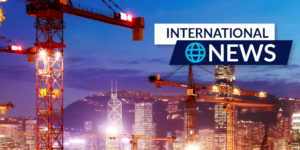
Many Chinese developers are facing the prospect of losing billions in payments as they reportedly cannot finish building residential complexes in the US and abroad.
At least two projects in the US run by Oceanwide Holdings are only partially completed and facing a lack of capital to buy supplies and pay contractors. One project in Los Angeles is currently facing over $50 million dollars in mechanics liens due to the ongoing debt situation in China.
Additionally, nearly 300 projects in 91 cities in China may become insolvent after the would-be residents of one complex united in protest against paying their mortgages in an email blast that has spread across the country.
Shortly after this social media blast, China’s head bank regulator urged its lenders to extend credit financing options to these troubled developers so that these projects can be completed. China’s central bank had capped these loans in August 2021 in order to help prevent these firms from becoming overleveraged — as $26.2 billion dollars in delayed loan payments would already be coming from these developers.
Back in 2013, China Evergrande Group was one of many that started selling high-yield dollar bonds to help finance many of these construction projects. These bonds enable outside investors to buy some of this debt in hopes of a big payout once the construction projects are completed. This also helps the developers and bankers receive much-needed capital.
However, many of these mortgage debts started to default in October 2021, and thus brought down the value of these bonds while raising interest rates on the loans. No one is currently sure how much debt may be exposed to these rising default rates as China does not share this data, but some experts estimate that it could be as high as $1.6 trillion dollars.
Since the early 2010s, many developers have sought capital financed through high-yield dollar bonds as capital was difficult to obtain in China. Over time, the country has faced similar demands for real estate that the US has faced, and recently the dollar’s strength has matched the euro. This in turn has created higher mortgage and interest payments for Chinese buyers.
Developers like Oceanwide and Kaia have faced such problems as the Chinese implemented measures to target investments in foreign real estate projects. Up until these policies were passed in 2016, China has been a major developer of US real estate projects. Former President Trump’s tariffs on China came soon after and further hindered developers’ abilities to make payments.
Additionally, before the second quarter of 2020, foreign investments in US real estate had made up 20% of the market’s total investment activity, according to a report from Deloitte. In 2021, that amount had dwindled to 7% due to the effects of the COVID-19 pandemic.
With all of these fears over the state of the Chinese economy, US contractors may be concerned if the foreign developer they’re working with has been exposed to this crisis.
Thankfully, US laws over mechanics liens are pretty straightforward, as they apply to any developer working on US soil.
Contractors can benefit from doing research and prequalifying any developer they plan to work with by looking at public business dealings, finances, and reviews from other contractors. Though Oceanwide Holdings has projects in Hawaii, New York, San Francisco, and Los Angeles contributing to revenues of 2.3 billion, the credit rating agency Standard & Poors gave Oceanwide a “negative” rating.
Oceanwide isn’t the anomaly in this crisis — other Chinese developers like Greenland, Anbang, and Z&L Properties are facing similar problems.
Each firm is scrambling to sell its real estate projects, find a local partner, or seek help from the Chinese government to obtain more financing capital. So far, Oceanwide has made the rare move in the industry to buy the rights to their San Franciso Ocean Plaza project without a local partner.